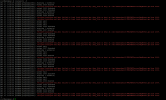Cannot Access Web Interface - I hope that the data will still be saved
- Thread starter elipso
- Start date
You are using an out of date browser. It may not display this or other websites correctly.
You should upgrade or use an alternative browser.
You should upgrade or use an alternative browser.
What does "mount" show?
What about "systemctl |grep pve" ?
How about "systemctl try-reload-or-restart pvedaemon pveproxy pvestatd pvescheduler" and then "journalctl -n 100" ?
Blockbridge : Ultra low latency all-NVME shared storage for Proxmox - https://www.blockbridge.com/proxmox
What about "systemctl |grep pve" ?
How about "systemctl try-reload-or-restart pvedaemon pveproxy pvestatd pvescheduler" and then "journalctl -n 100" ?
Blockbridge : Ultra low latency all-NVME shared storage for Proxmox - https://www.blockbridge.com/proxmox
What does "mount" show?
What about "systemctl |grep pve" ?
How about "systemctl try-reload-or-restart pvedaemon pveproxy pvestatd pvescheduler" and then "journalctl -n 100" ?
Blockbridge : Ultra low latency all-NVME shared storage for Proxmox - https://www.blockbridge.com/proxmox
Hi, here is:
Code:
root@proxmox:~# mount
sysfs on /sys type sysfs (rw,nosuid,nodev,noexec,relatime)
proc on /proc type proc (rw,relatime)
udev on /dev type devtmpfs (rw,nosuid,relatime,size=32869640k,nr_inodes=8217410,mode=755,inode64)
devpts on /dev/pts type devpts (rw,nosuid,noexec,relatime,gid=5,mode=620,ptmxmode=000)
tmpfs on /run type tmpfs (rw,nosuid,nodev,noexec,relatime,size=6580924k,mode=755,inode64)
/dev/mapper/pve-root on / type ext4 (rw,relatime,errors=remount-ro)
securityfs on /sys/kernel/security type securityfs (rw,nosuid,nodev,noexec,relatime)
tmpfs on /dev/shm type tmpfs (rw,nosuid,nodev,inode64)
tmpfs on /run/lock type tmpfs (rw,nosuid,nodev,noexec,relatime,size=5120k,inode64)
cgroup2 on /sys/fs/cgroup type cgroup2 (rw,nosuid,nodev,noexec,relatime)
pstore on /sys/fs/pstore type pstore (rw,nosuid,nodev,noexec,relatime)
bpf on /sys/fs/bpf type bpf (rw,nosuid,nodev,noexec,relatime,mode=700)
systemd-1 on /proc/sys/fs/binfmt_misc type autofs (rw,relatime,fd=30,pgrp=1,timeout=0,minproto=5,maxproto=5,direct,pipe_ino=62619)
tracefs on /sys/kernel/tracing type tracefs (rw,nosuid,nodev,noexec,relatime)
mqueue on /dev/mqueue type mqueue (rw,nosuid,nodev,noexec,relatime)
debugfs on /sys/kernel/debug type debugfs (rw,nosuid,nodev,noexec,relatime)
hugetlbfs on /dev/hugepages type hugetlbfs (rw,relatime,pagesize=2M)
fusectl on /sys/fs/fuse/connections type fusectl (rw,nosuid,nodev,noexec,relatime)
configfs on /sys/kernel/config type configfs (rw,nosuid,nodev,noexec,relatime)
ramfs on /run/credentials/systemd-sysusers.service type ramfs (ro,nosuid,nodev,noexec,relatime,mode=700)
ramfs on /run/credentials/systemd-tmpfiles-setup-dev.service type ramfs (ro,nosuid,nodev,noexec,relatime,mode=700)
ramfs on /run/credentials/systemd-sysctl.service type ramfs (ro,nosuid,nodev,noexec,relatime,mode=700)
ramfs on /run/credentials/systemd-tmpfiles-setup.service type ramfs (ro,nosuid,nodev,noexec,relatime,mode=700)
binfmt_misc on /proc/sys/fs/binfmt_misc type binfmt_misc (rw,nosuid,nodev,noexec,relatime)
sunrpc on /run/rpc_pipefs type rpc_pipefs (rw,relatime)
lxcfs on /var/lib/lxcfs type fuse.lxcfs (rw,nosuid,nodev,relatime,user_id=0,group_id=0,allow_other)
tmpfs on /run/user/0 type tmpfs (rw,nosuid,nodev,relatime,size=6580920k,nr_inodes=1645230,mode=700,inode64)
root@proxmox:~#Here is systemctl |grep pve:
Code:
root@proxmox:~# systemctl |grep pve
● pve-cluster.service loaded failed failed The Proxmox VE cluster filesystem
● pve-firewall.service loaded failed failed Proxmox VE firewall
● pve-guests.service loaded failed failed PVE guests
● pve-ha-crm.service loaded failed failed PVE Cluster HA Resource Manager Daemon
● pve-ha-lrm.service loaded failed failed PVE Local HA Resource Manager Daemon
pve-lxc-syscalld.service loaded active running Proxmox VE LXC Syscall Daemon
pvebanner.service loaded active exited Proxmox VE Login Banner
pvedaemon.service loaded active running PVE API Daemon
pvefw-logger.service loaded active running Proxmox VE firewall logger
pvenetcommit.service loaded active exited Commit Proxmox VE network changes
pveproxy.service loaded active running PVE API Proxy Server
● pvescheduler.service loaded failed failed Proxmox VE scheduler
● pvestatd.service loaded failed failed PVE Status Daemon
dev-pve-swap.swap loaded active active /dev/pve/swap
pve-storage.target loaded active active PVE Storage Target
pve-daily-update.timer loaded active waiting Daily PVE download activities
root@proxmox:~#And after systemctl try-reload-or-restart pvedaemon pveproxy pvestatd pvescheduler
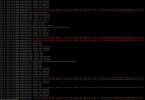
Last edited:
Start by going through each failed service, ie:
systemctl status pvestatd
https://photobyte.org/troubleshooting-systemd-services/
Go back to logs from the boot time and analyze them: journalctl -b0
As you saw in systemctl output - things are not great.
Good luck
Blockbridge : Ultra low latency all-NVME shared storage for Proxmox - https://www.blockbridge.com/proxmox
systemctl status pvestatd
https://photobyte.org/troubleshooting-systemd-services/
Go back to logs from the boot time and analyze them: journalctl -b0
As you saw in systemctl output - things are not great.
Good luck
Blockbridge : Ultra low latency all-NVME shared storage for Proxmox - https://www.blockbridge.com/proxmox
Start by going through each failed service, ie:
systemctl status pvestatd
https://photobyte.org/troubleshooting-systemd-services/
Go back to logs from the boot time and analyze them: journalctl -b0
As you saw in systemctl output - things are not great.
Good luck
Blockbridge : Ultra low latency all-NVME shared storage for Proxmox - https://www.blockbridge.com/proxmox
I fixed part of this issue with the following:
Code:
sqlite> .mode insert
sqlite> .output config.sql
sqlite> .dump
sqlite> .exit
root@proxmox:~# mv /var/lib/pve-cluster/config.db config.db.original
root@proxmox:~# sqlite3 /var/lib/pve-cluster/config.db < config.sql
root@proxmox:~# sqlite3 /var/lib/pve-cluster/config.db
sqlite> analyze;
sqlite> PRAGMA integrity_check;
okNow is web live. But there missing LVM-Thin disk and VM
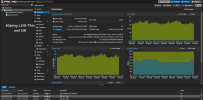
Last edited:
Code:
root@proxmox:~# mount
sysfs on /sys type sysfs (rw,nosuid,nodev,noexec,relatime)
proc on /proc type proc (rw,relatime)
udev on /dev type devtmpfs (rw,nosuid,relatime,size=32869660k,nr_inodes=8217415,mode=755,inode64)
devpts on /dev/pts type devpts (rw,nosuid,noexec,relatime,gid=5,mode=620,ptmxmode=000)
tmpfs on /run type tmpfs (rw,nosuid,nodev,noexec,relatime,size=6580928k,mode=755,inode64)
/dev/mapper/pve-root on / type ext4 (rw,relatime,errors=remount-ro)
securityfs on /sys/kernel/security type securityfs (rw,nosuid,nodev,noexec,relatime)
tmpfs on /dev/shm type tmpfs (rw,nosuid,nodev,inode64)
tmpfs on /run/lock type tmpfs (rw,nosuid,nodev,noexec,relatime,size=5120k,inode64)
cgroup2 on /sys/fs/cgroup type cgroup2 (rw,nosuid,nodev,noexec,relatime)
pstore on /sys/fs/pstore type pstore (rw,nosuid,nodev,noexec,relatime)
bpf on /sys/fs/bpf type bpf (rw,nosuid,nodev,noexec,relatime,mode=700)
systemd-1 on /proc/sys/fs/binfmt_misc type autofs (rw,relatime,fd=30,pgrp=1,timeout=0,minproto=5,maxproto=5,direct,pipe_ino=60538)
mqueue on /dev/mqueue type mqueue (rw,nosuid,nodev,noexec,relatime)
tracefs on /sys/kernel/tracing type tracefs (rw,nosuid,nodev,noexec,relatime)
debugfs on /sys/kernel/debug type debugfs (rw,nosuid,nodev,noexec,relatime)
hugetlbfs on /dev/hugepages type hugetlbfs (rw,relatime,pagesize=2M)
fusectl on /sys/fs/fuse/connections type fusectl (rw,nosuid,nodev,noexec,relatime)
configfs on /sys/kernel/config type configfs (rw,nosuid,nodev,noexec,relatime)
ramfs on /run/credentials/systemd-sysusers.service type ramfs (ro,nosuid,nodev,noexec,relatime,mode=700)
ramfs on /run/credentials/systemd-tmpfiles-setup-dev.service type ramfs (ro,nosuid,nodev,noexec,relatime,mode=700)
ramfs on /run/credentials/systemd-sysctl.service type ramfs (ro,nosuid,nodev,noexec,relatime,mode=700)
ramfs on /run/credentials/systemd-tmpfiles-setup.service type ramfs (ro,nosuid,nodev,noexec,relatime,mode=700)
binfmt_misc on /proc/sys/fs/binfmt_misc type binfmt_misc (rw,nosuid,nodev,noexec,relatime)
sunrpc on /run/rpc_pipefs type rpc_pipefs (rw,relatime)
lxcfs on /var/lib/lxcfs type fuse.lxcfs (rw,nosuid,nodev,relatime,user_id=0,group_id=0,allow_other)
/dev/fuse on /etc/pve type fuse (rw,nosuid,nodev,relatime,user_id=0,group_id=0,default_permissions,allow_other)
tmpfs on /run/user/0 type tmpfs (rw,nosuid,nodev,relatime,size=6580924k,nr_inodes=1645231,mode=700,inode64)
root@proxmox:~#Here is: journalctl -n 100
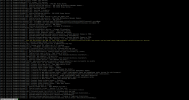
Code:
root@proxmox:~# systemctl |grep pve
etc-pve.mount loaded active mounted /etc/pve
pve-cluster.service loaded active running The Proxmox VE cluster filesystem
pve-firewall.service loaded active running Proxmox VE firewall
pve-guests.service loaded active exited PVE guests
pve-ha-crm.service loaded active running PVE Cluster HA Resource Manager Daemon
pve-ha-lrm.service loaded active running PVE Local HA Resource Manager Daemon
pve-lxc-syscalld.service loaded active running Proxmox VE LXC Syscall Daemon
pvebanner.service loaded active exited Proxmox VE Login Banner
pvedaemon.service loaded active running PVE API Daemon
pvefw-logger.service loaded active running Proxmox VE firewall logger
pvenetcommit.service loaded active exited Commit Proxmox VE network changes
pveproxy.service loaded active running PVE API Proxy Server
pvescheduler.service loaded active running Proxmox VE scheduler
pvestatd.service loaded active running PVE Status Daemon
dev-pve-swap.swap loaded active active /dev/pve/swap
pve-storage.target loaded active active PVE Storage Target
pve-daily-update.timer loaded active waiting Daily PVE download activities
root@proxmox:~#Looks like VM are still on Disks, how to enable LVM-Thin disk and VM ?
Last edited:
you will need to recreate VM config and point the disks to the one that already exist. Be careful to avoid overwriting or deleting the disks accidentally.
Make a backup.
You can use either UI or "qm" CLI to create VM.
Blockbridge : Ultra low latency all-NVME shared storage for Proxmox - https://www.blockbridge.com/proxmox
Make a backup.
You can use either UI or "qm" CLI to create VM.
Blockbridge : Ultra low latency all-NVME shared storage for Proxmox - https://www.blockbridge.com/proxmox
you will need to recreate VM config and point the disks to the one that already exist. Be careful to avoid overwriting or deleting the disks accidentally.
Make a backup.
You can use either UI or "qm" CLI to create VM.
Blockbridge : Ultra low latency all-NVME shared storage for Proxmox - https://www.blockbridge.com/proxmox
Would you be able to show me some instructions, and especially how to backup safely.
Your current disks are raw block LVM slices. Given that you are missing half the config required for PVE backup, your other choice is to "dd"/clone disk to another disk, dd/clone each LVM slice on its own, or find some other 3rd party backup program capable of handling LVM.
After that just create an appropriate VM, ie: qm create 100
Then scan the disks in qm disk rescan 100
The disks will be added as unknwon, you can use UI to assign them to scsi/ide/etc.
If you had any custom configuration in VM, you will need to add it as well.
Blockbridge : Ultra low latency all-NVME shared storage for Proxmox - https://www.blockbridge.com/proxmox
After that just create an appropriate VM, ie: qm create 100
Then scan the disks in qm disk rescan 100
The disks will be added as unknwon, you can use UI to assign them to scsi/ide/etc.
If you had any custom configuration in VM, you will need to add it as well.
Blockbridge : Ultra low latency all-NVME shared storage for Proxmox - https://www.blockbridge.com/proxmox
Your current disks are raw block LVM slices. Given that you are missing half the config required for PVE backup, your other choice is to "dd"/clone disk to another disk, dd/clone each LVM slice on its own, or find some other 3rd party backup program capable of handling LVM.
After that just create an appropriate VM, ie: qm create 100
Then scan the disks in qm disk rescan 100
The disks will be added as unknwon, you can use UI to assign them to scsi/ide/etc.
If you had any custom configuration in VM, you will need to add it as well.
Blockbridge : Ultra low latency all-NVME shared storage for Proxmox - https://www.blockbridge.com/proxmox
Ok i create qm create 105
Code:
root@proxmox:~# qm disk rescan 105
400 too many arguments
qm disk rescan [OPTIONS]
root@proxmox:~#man qm
/ disk rescan
Blockbridge : Ultra low latency all-NVME shared storage for Proxmox - https://www.blockbridge.com/proxmox
/ disk rescan
Code:
qm disk rescan [OPTIONS]
Rescan all storages and update disk sizes and unused disk images.
--dryrun <boolean> (default = 0)
Do not actually write changes out to VM config(s).
--vmid <integer> (1 - N)
The (unique) ID of the VM.Blockbridge : Ultra low latency all-NVME shared storage for Proxmox - https://www.blockbridge.com/proxmox
man qm
/ disk rescan
Code:qm disk rescan [OPTIONS] Rescan all storages and update disk sizes and unused disk images. --dryrun <boolean> (default = 0) Do not actually write changes out to VM config(s). --vmid <integer> (1 - N) The (unique) ID of the VM.
Blockbridge : Ultra low latency all-NVME shared storage for Proxmox - https://www.blockbridge.com/proxmox
Code:
root@proxmox:~# qm disk rescan --vmid 105
rescan volumes...
VM 105 add unreferenced volume 'local-lvm:vm-105-disk-0' as 'unused0' to config
root@proxmox:~#Says no bootable device
did you do this? Look at your VM config. May be you didnt add boot device? May be you didnt set "boot order". Keep working at it.The disks will be added as unknwon, you can use UI to assign them to scsi/ide/etc.
Have a good weekend
Code:
man qm|grep boot
--boot [[legacy=]<[acdn]{1,4}>] [,order=<device[;device...]>]
Specify guest boot order. Use the order= sub-property as usage with no key or legacy= is deprecated.
--bootdisk (ide|sata|scsi|virtio)\d+
Enable booting from specified disk. Deprecated: Use boot: order=foo;bar instead.Blockbridge : Ultra low latency all-NVME shared storage for Proxmox - https://www.blockbridge.com/proxmox
Some news:
I must go to Options Boot Order and disable and again enable boot device, then start working.
After system reboot kernel gut stuck and must choose older one with proxmox-boot-tool

Next:
I don't know why but vm-102-disk-0 raw is missing. I already say goodbye to them.
Next:
When i click on shell says: Unable to open Shell : Connection failed (Error 500: Timeout while waiting for port '5900' to get ready!)
There is missing 127.0.0.1 localhost inside /etc/hosts
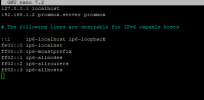
Next:
I get some error in Syslog with:
Fixed with:
I must go to Options Boot Order and disable and again enable boot device, then start working.
After system reboot kernel gut stuck and must choose older one with proxmox-boot-tool

Next:
I don't know why but vm-102-disk-0 raw is missing. I already say goodbye to them.
Next:
When i click on shell says: Unable to open Shell : Connection failed (Error 500: Timeout while waiting for port '5900' to get ready!)
There is missing 127.0.0.1 localhost inside /etc/hosts

Next:
I get some error in Syslog with:
Code:
[status] notice: RRDC update error /var/lib/rrdcached/db/pve2-storage/pve/VMs: -1Fixed with:
Code:
cd /var/lib/
systemctl stop rrdcached
mv rrdcached rrdcached.bck
systemctl start rrdcached
systemctl restart pve-cluster

